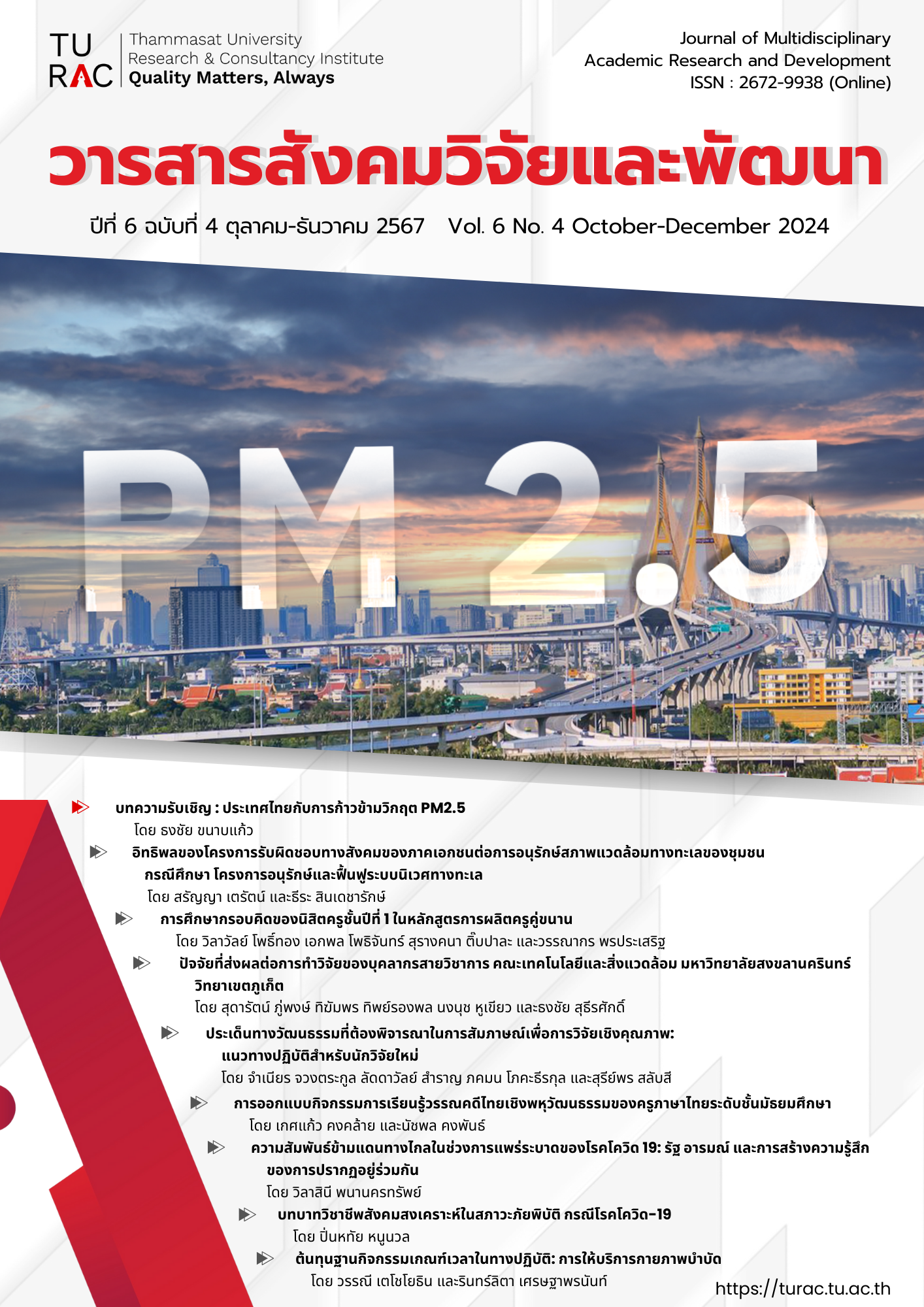Exploring First-year Preservice Teachers’ Mindsets in a Dual Curriculum of Teacher Education
Keywords:
Mindset, Growth mindset, Fixed mindset, Preservice teacher, Duo curriculum of teacher educationAbstract
Mindset is a process of thoughts, attitudes, and beliefs that affect a person's approach to success and self-development. Mindset also affects one’s ability to adapt to changing conditions and environments in society. This study is a survey-research that aims to observe the significance of mindset by conducting comparative studies in the context of genders and academic achievements. This research also involves the studying of relationship between mindset, gender, and academic achievement of first-year preservice teachers in a dual curriculum of teacher education. The sample group for this study consists of 231 first year students. The research results found that overall students perceive themselves as having a dynamic mindset (average between 4.71-5.35), especially in the aspect of trying to learn from mistakes. The element that students had the least on the aspect of dynamic mindset is the view that they can increase their own intelligence as much as they want. As for the static mindset, the average was between 1.94-4.59. The element that students agreed with the most was on the aspect that they have the capability to work to prove one’s intelligence. On the other hand, the element that students agreed with the least under the aspect of static mindset was that students were unable to change their intelligence level. While the results of comparison between genders show that male and female students' mindsets were not significantly different at statistic outcome of 0.05. In addition, when comparing academic achievement, the study shows that students with high, medium, and low academic achievements had significantly different mindsets at the rate 0.05. Also, when studying the relationship, it was found that growth mindset and gender does not have significant correlation at the statistic rate of 0.05. However, the growth mindset and academic achievement of first-year pre-service teacher students had a statistically low level of positive relationship at the level of 0.05.
References
กุสุมา ยกชู. (2561). การศึกษาและเสริมสร้างกรอบคิดงอกงามของนักศึกษาวิชาชีพครู. (วิทยานิพนธ์ปรัชญาดุษฏีบัณฑิต, สาขาวิชาการวิจัยและพัฒนาศักยภาพมนุษย์, มหาวิทยาลัยศรีนครินทรวิโรฒ).
แครอล เอส ดเว็ค. (2561). Mindset ใช้ความคิดเอาชนะโชคชะตา. (พรรณี ชูจิรวงศ์, ผู้แปล). กรุงเทพฯ: วีเลิร์น.
จุฬาลักษณ์ ทิพวัน และวราพร เอราวรรณ์. (2563). การพัฒนาตัวบ่งชี้กรอบความคิดแบบเตบโต สำหรับนักเรียนชั้นประถมศึกษาปีที่ 6. วารสารการวัดผลการศึกษา มหาวิทยาลัยมหาสารคาม. 26(2), 119-133. สืบค้นจาก https://so02.tci-thaijo.org/index.php/jemmsu/article/download/209705/166842/.
นัฐพร เกียรติบัณฑิตกุล. (2565). ความสัมพันธ์ระหว่างกรอบคิดติดยึดและการรับรู้ความสามารถแห่งตนของนักเรียนนายร้อย. วารสารมนุษยศาสตร์และสังคมศาสตร์นายเรืออากาศ. 10, 20-32.
ปิยวรรณ วิเศษสุวรรณภูมิ และพิทชยา ตั้งพรไพบูลย์. (2566). กรอบความคิดแบบเติบโต: ทักษะที่จำเป็นแห่งโลกยุคพลิกผัน. วารสารครุศาสตร์. 51(1), 1-12.
มานิกา วิเศษสาธร, ปิยพงศ์ แซ่ตั้ง, รพีกรณ์ เปี่ยมพืช และจุฑามาส สรุปราษฎร์. (2565). การพัฒนาแบบวัด Growth Mindset สำหรับครูผู้สอนวิทยาการคำนวณ. วารสารศึกษาศาสตร์ มหาวิทยาลัยนเรศวร. 24(2), 232-247.
มุทิตา อดทน, วรากร ทรัพย์วิระปกรณ์, และจุฑามาศ แหนจอน. (2561). ผลของโปรแกรมการพัฒนากรอบความคิดเติบโตในนักเรียนชั้นมัธยมศึกษาตอนปลาย. วารสารการวัดผลการศึกษา มหาวิทยาลัยมหาสารคาม. 24(2), 182-194. สืบค้นจาก https://so02.tci-thaijo.org/index.php/jemmsu/article/download/174766/125104/493860.
วิลาวัลย์ โพธิ์ทอง, ราตรีรัตน์ ใจวงค์, วัชรากร จำรัส, ศุภาพิชญ์ มีชัยทรัพย์เจริญ, อรจิรา ศรีสุข และรุ่งทิพย์ แซ่แต้. (2565). ความสัมพันธ์ระหว่างกรอบคิดและการคิดเชิงออกแบบของนักเรียนระดับมัธยมศึกษา โรงเรียนสามัคคีวิทยาคม จังหวัดเชียงราย. วารสารศึกษาศาสตร์ มหาวิทยาลัยทักษิณ. 22(1), 93-107.
ศรัญญู พงศ์ประเสริฐสิน, จิตรา ดุษฎีเมธา และมารุต พัฒผล. (2565). การวิเคราะห์องค์ประกอบเชิงยืนยันของชุดความคิดแบบเติบโตสำหรับนักศึกษาวิชาชีพครู. วารสารสังคมศาสตร์และมานุษยวิทยาเชิงพุทธ. 7(3), 161-175.
อังศวีร์ เครือแก้ว. (2562). กรอบความคิด (mindset) กับผลสัมฤทธิ์การปฏิบัติงาน กรณีศึกษาบุคลากรสายสนับสนุนภายใต้ สำนักงานมหาวิทยาลัย จุฬาลงกรณ์มหาวิทยาลัย. (สารนิพนธ์หลักสูตรปริญญารัฐประศาสนศาสตรมหาบัณฑิต, จุฬาลงกรณ์มหาวิทยาลัย).
Baker, J. L. W. (2017). Growth Mindset and Its Effect on Math Achievement. Retrieved from https://digitalcommons.csumb.edu/caps_thes_all/133.
Barbouta, A., Barbouta, C. & Kotrotsiou, S. (2020). Growth Mindset and Grit: How Do University Students’ Mindsets and Grit Affect their Academic Achievement?. International Journal of Caring Sciences. 13(1), 654-664.
Cronbach, L. J. (1990). Essentials of psychological testing. (5th ed.). New York: Harper Collins Publishers.
Degol, J. L., Wang, M. T., Zhang, Y. & Allerton, J. (2018). Do Growth Mindsets in Math Benefit Females? Identifying Pathways between Gender, Mindset, and Motivation. Journal of Youth Adolescence. 47, 976–990. Retrieved from https://doi.org/10.1007/s10964-017-0739-8.
Dweck, C. S. (1999). Self-theories: Their role in motivation, personality, and development. New York: Psychology Press.
Dweck, C. S. (2000). Self-Theories: Their Role in Motivation, Personality, and Development. New York: Random House.
Dweck, C. S. (2006). Mindset : The new psychology of success. New York: Random House.
Faria, L., & Fontaine, A. M. (1997). Adolescents' personal conceptions of intelligence: The development of a new scale and some exploratory evidence. European Journal of Psychology of Education. 12(1), 51-62.
Herdian, Wahidah, F. R. N., Haryanto, T. & Fauzan, A. (2021). Is there any difference in the growth mindset between male and female students during a pandemic?. International Journal of Research and Review. 8(7), 245-250.
Krejcie, R. V., & Morgan, D. W. (1970). Determining sample size for research activities. Educational and Psychological Measurement. 30(03), 608.
Ryan, S., & Mercer, S. (2012). Language learning mindsets across cultural settings: English learners in Austria and Japan. OnCUE Journal. 6(1), 6–22.
Sigmundsson, H., Guðnason, S., & Jóhannsdóttir, S. (2021). Passion, grit and mindset: Exploring gender differences. New Ideas in Psychology. 63, 1-5. Retrieved from https://doi.org/10.1016/j.newideapsych.2021.100878.
Downloads
Published
How to Cite
Issue
Section
License
Copyright (c) 2024 Journal of Multidisciplinary Academic Research and Development (JMARD)

This work is licensed under a Creative Commons Attribution-NonCommercial-NoDerivatives 4.0 International License.



